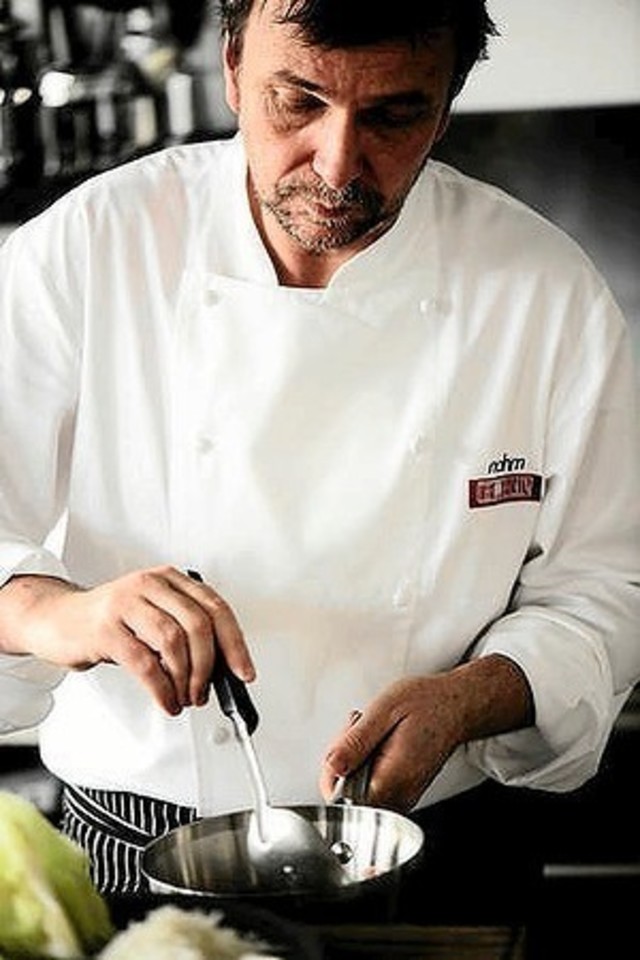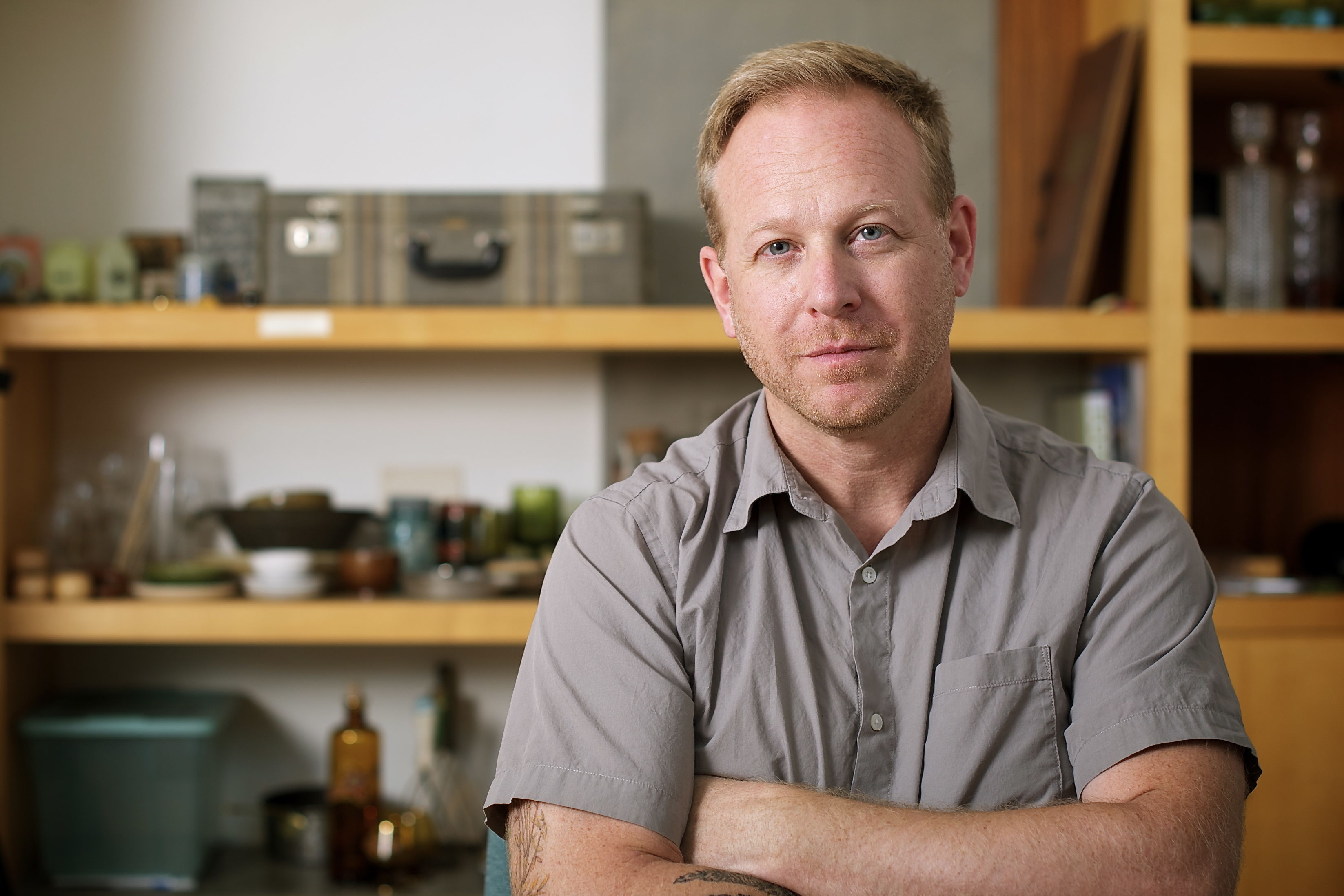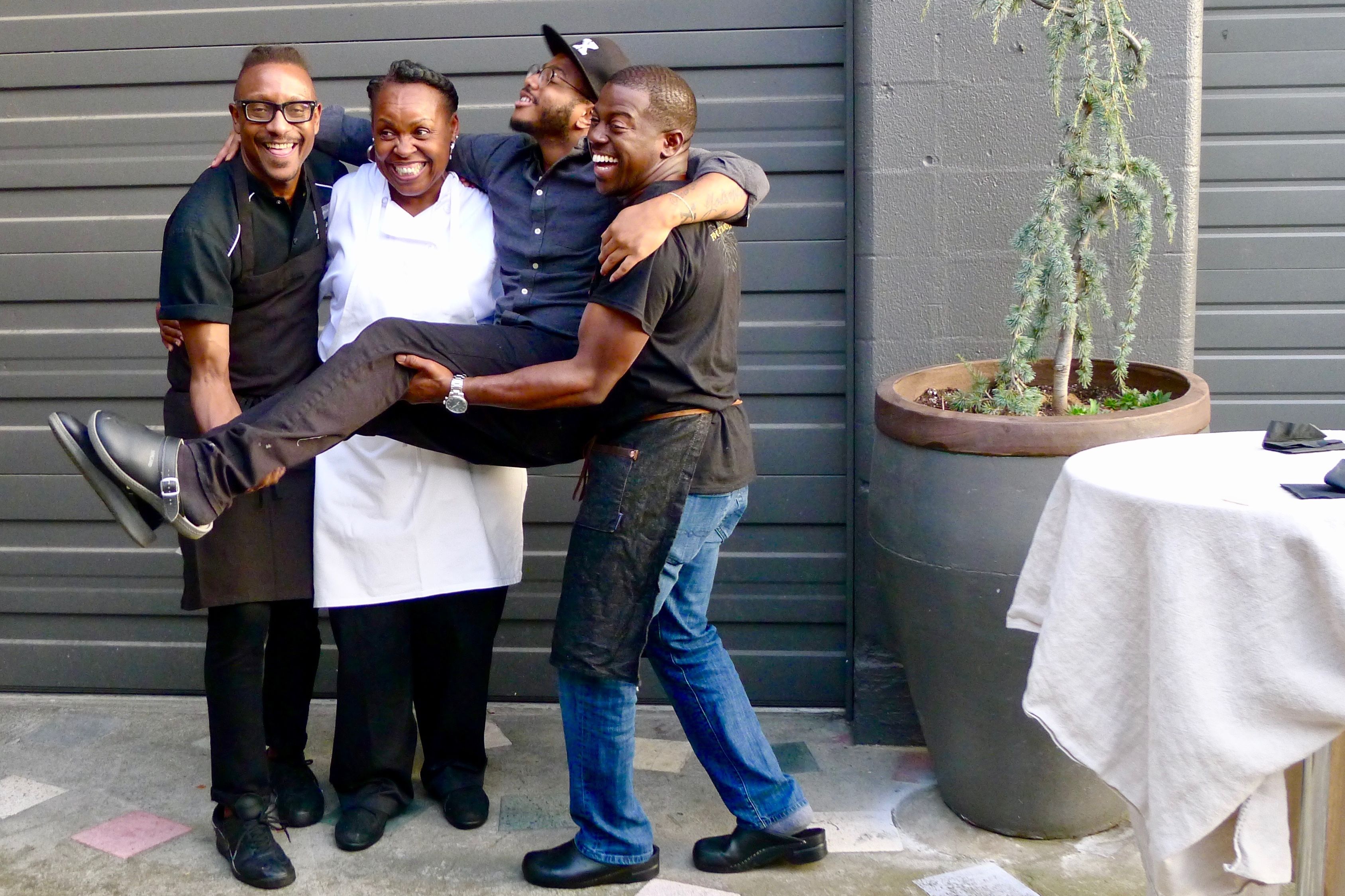Sultans of Siam

Chef David Thompson
Pok Pok owner Andy Ricker has earned a national audience and a big book contract for his from-the-heart Thai food restaurants in Portland and now, New York City. Though he’s a newcomer to Manhattan, the New York Times recently handed Pok Pok two impressive stars. But even Ricker has his heroes, most notably Australian chef and Thai food scholar David Thompson. Thompson had about a decade’s head start on Ricker, opening acclaimed Thai restaurants first in Sydney, and later in London in 2001, after first falling in love with Thai culture in the 1980s. The London outpost of Nahm earned (then lost) a coveted Michelin star. Most recently, Thompson opened a second Nahm restaurant right in the heart of Bangkok. His cookbook, Thai Food (Ten Speed Press, 2002), doubles as a seminal treatise on the title topic.
Despite farflung interests and crazy schedules, Ricker and Thompson landed in Portland for late September’s inaugural Feast Portland food-lover’s spectacular. As Feast closed its four-day run, they cooked up an unforgettable Thai feast in the future home of Pok Pok Lat Khao (3384 SE Division St), quickly selling out two fifty-strong seatings at $120 a pop. Before service, Ricker and Thompson sat still (briefly) to respond to questions. (Answers have been edited for brevity and clarity.)
Q: In a recent online dialogue between New York writer Francis Lam and chef/writer Eddie Huang, Huang suggested that Caucasians like yourselves who cook Asian food are stealing Asian culture. Should a chef of one culture stick to the food of the chef’s own culture?
Ricker: I think you are missing a little of the subtlety of Eddie’s argument. What he’s primarily referencing are cooks who read a book or maybe just go eat at a Thai restaurant, then put on their own menu a dish with a few peanuts and a little coriander that they call “Thai ribs” that has absolutely nothing to do with Thailand. He’s primarily targeting those who take a very cursory glance at a cuisine then appropriate the name.
Q: I read his comments more broadly than that…
Ricker: Well, I was privy to that whole conversation and what I mentioned was one part of it. The other part of it is, as a whole, he’s a young angry Asian-American kid who has seen his culture co-opted. I understand what he’s saying, though I don’t agree 100 per cent with it.
Thompson: Speaking about Thai food, there is an intrinsic or innate capacity of taste if you are Thai or have grown up in that culture, and it’s very hard to train others in the subtleties of the cuisine. There are some people who get it, but it takes a period of years, often much longer than those who Eddie is condemning who may just pick up a book. It takes a terribly long time.
Ricker: I would add that this controversy is almost exclusively applied to white people cooking Asian food. How is it that an Irish guy from Wisconsin is considered one of the best Italian chefs in America. How did that happen? He studied it. David’s been studying the food of Thailand for a long time. I’ve been studying it for about 20 years. So why is it that a guy who’s maybe 25 years old and been to France once is all of a sudden considered a great French chef?
Thompson: …or what about the great Japanese chefs who cook European food?
Ricker: Exactly. Why is that not criticized? Why can’t somebody learn a cuisine? You can learn. As David says, it takes a long time. I didn’t feel comfortable for 13 years before I opened the little shack that was the original Pok Pok. I wasn’t 100 percent confident going into it that I was really ready. Any kind of great cuisine requires a lot of study. I argue that’s the same for any cuisine. You can’t go to Italy for a month and come back understanding Italian cuisine. It’s just not possible.
There’s another factor too: talent level. Are you a good cook? Are you open to understanding things? Can you remove your ego from the equation enough to…it’s like being a winemaker and wanting to put your personality on the wine so much that you start getting in the way of the grapes. Are you able to get to the bottom of stuff and start growing from there?
I think at this point David has gotten so far into Thai cuisine that he now has carte blanche to do whatever he wants because he just understands all the elements all the time.
Thompson: I first opened Darley Street Thai in King’s Cross, Sydney…I think it was 1990. I had been cooking Thai food for five or six years before that. I had been cooking for a lot longer, though mostly French and other European food.
Q: Aside from Thai food, is there another world cuisine that’s un- or underappreciated in the West?
Thompson: Iranian food. I love the complexity of it, the use of herbs, the way they cook rice. It’s sophisticated. It has all the hallmarks of a great cuisine. They have the royal food that goes back hundreds of years, so you’ve got a venerable heritage. You also have a diversity of ingredients. Another place is India…and also China.
Ricker: My God, China. It’s not the cuisine, but the cuisines. Now, I don’t know that much about China, but if you think about it, there are literally hundreds of ethnic groups and languages and cuisines. There are the indigenous people who are not considered Chinese and who live in these tiny little valleys—and they all have their own foods. Chinese food also has probably the largest influence of any cuisine world- wide. Literally, there is Chinese food or derivatives in every country in the world. You go to Panama City and there’s a Chinatown; it’s the oldest in the Americas. That’s where you’ll find some real Chino-Latino food, not something that was made up in Las Vegas last month. There’s also the influence in Macau, where Chinese is pushed together with Portuguese food.
Thompson: The Chinese-Portuguese cuisine goes back to the early 1500s. I know the Portuguese made it up to Siam in 1560 or around that time.
Ricker: In the United States, many cuisines have been relegated to the position of commodity fast food that don’t deserve it. Mexican food is one. No matter how hard a Mexican restaurateur tries, people just want to have tortillas and guacamole. And it’s very difficult because there are such amazing, incredibly varied regional cuisines in Mexico. Yucatecan, for example. I love it, but haven’t really seen a good Yucatecan restaurant in the United States because they end up making the same tacos everyone else has.
Thompson: It’s not so much that these cuisines are unknown; it’s just that they are misrepresented in the West. You can go through the sweep of all the continents and roughly the same thing is true.
Ricker: There some very sophisticated foods is being made in Mexico. [Author] Diana Kennedy was a big proponent of it. But no one’s making these foods. And I think it has mostly to do with commerce. You may have people from a particular place who open a restaurant, but there aren’t enough other people from the same place who are willing to support them or they just decide to serve the needs of the already existing population. The point is that there’s more to Mexican food than tortillas, tacos and stews.
Thompson: There’s also the problem of obtaining the right ingredients. Sometimes it’s just impossible.
Q: David, what was your goal in opening Nahm? Weren’t you trying to present undiluted 19th century Thai royal cuisine?
Thompson: I was trying to make Thai food as I understand it was being eaten in the past. Because unlike Western food, where I think there was a steady improvement, Thai food was better 100 years ago. There was certainly a greater diversity and a greater unalloyed taste. The great complex Thai food and the complex cuisines of other countries were compromised because of the labor it took to make it. The cost of ingredients also began to impinge on production. In those ancient arcades of Siam, labor and food costs were the least considered commodities. It was all about taste.
Q: Andy, how do assess dilution of Thai cuisine?
Ricker: There’s the way society works in Thailand today. You’ve got a shift to the urban centers of commerce and recently the move to a middle class where people are working and don’t have as much time to cook because everyone has a job. There’s shifting taste, too, and a lot of influence from the outside. That’s always been true in Thailand.
Thompson: Such as the chilies the Portuguese probably brought to Siam or the noodles that the Chinese brought.
Ricker: Or more recent influences from the Koreans and Japanese. What the casual observer will see and eat on the streets of Thailand, they see as Thai food…
Thompson: …but it’s really hybridized food.
Ricker: One of the most popular street foods in Thailand right now is the hot dog. It’s this really disgusting pork paste with food coloring, formed into different shapes and deep-fried. It’s horrifying.
Thomspon: In ancient Thailand, the royal courts were the bastion of culture and that’s where the great cooks were. Thai culture traditionally has hinged on the soul and the stomach. The monks and the kitchens are what the Thai people love most of all. Even today, that’s still the case.
Ricker: The family and Buddha connect through food.
Q: So you both agree that dilution of Thai culinary culture has occurred and is ongoing?
Thompson: Yes, you can say that. But it’s evolution too. It’s the natural consequence of a society having the influence from outside thrust upon it. So, yes you can say that it’s a dilution of Thai culinary culture…
Ricker: …but it’s still Thailand. These disgusting hot dogs on the street are still Thai. They are made to Thai tastes. If you look at the dishes especially those made in central Thailand that appear to be Chinese, even if it’s a Chinese person in Thailand making the dish, they are still Thai versions of the Chinese dish. It’s made the way a Chinese-Thai would make it. There’s a certain Thai balance of flavors. The same dish wouldn’t taste the same in China.
If you look at Thai food made in America, basically they’ve taken dishes that are ostensibly Thai, but they have altered them to suit the American palate.
Q: To shift gears, what do you make of the activities of food bloggers and other food obsessives in restaurants these days—the cameras and tweeting and so forth?
Thompson: I don’t care much about it. If it doesn’t affect someone else, then it’s like anything else that happens in your restaurant. You can’t actually prevent people from doing whatever they wish as long as it does not impinge upon other people.
Ricker: I think it really depends on what kind of battles you want to have. You can post rules, but then you have to enforce them.
Thompson: I would agree. There’s this wonderful cook in Sydney, a Japanese woman. Her regulations are stern! You have to order food a certain way, you have to come in at a certain time—you can’t be late, you have to sit up straight…
Ricker: She went out of business.
Thompson: No, she decided to close. And left Sydney saying, “you’re all rude.” Of course, she was quite right, too.




